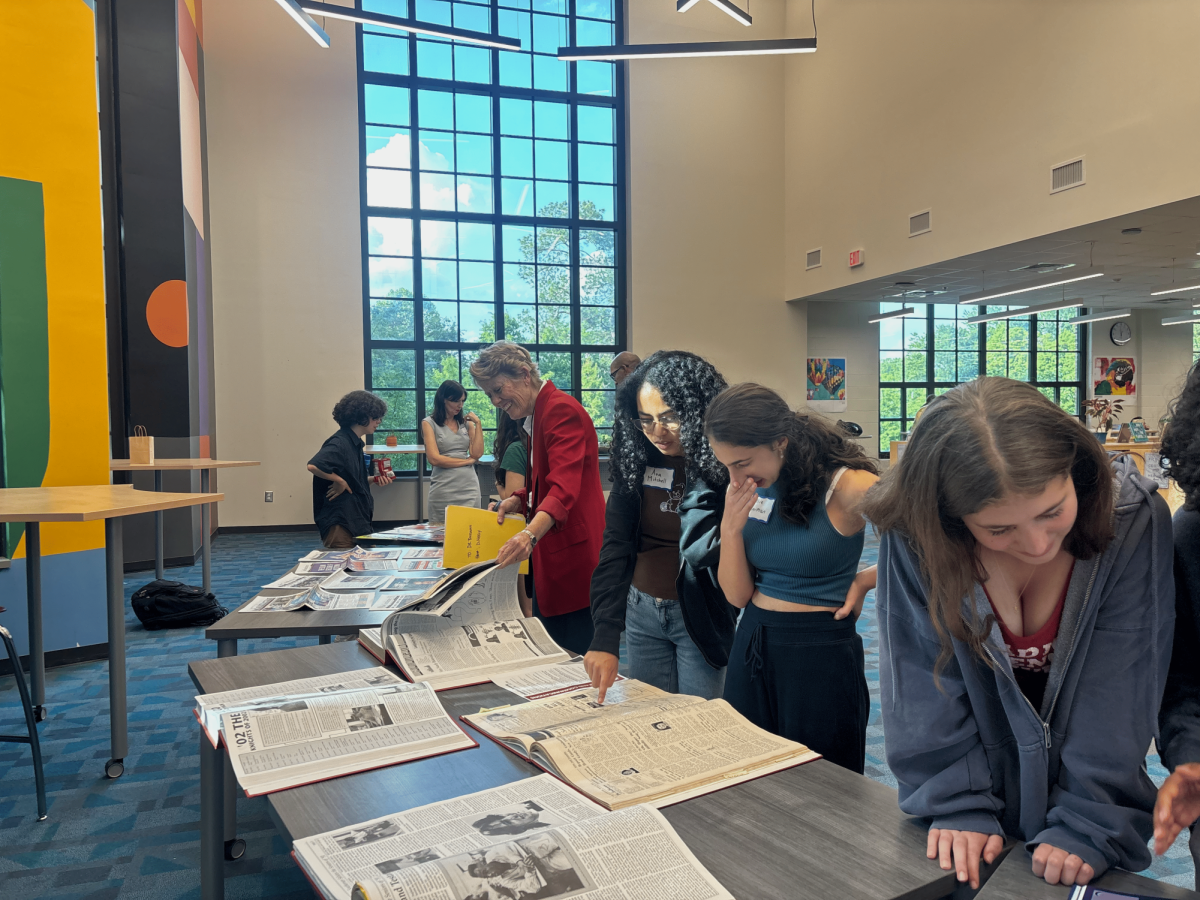I purposelessly look through the Instagram newsfeed. Among posts my eyes are eagerly looking for familiar faces of former classmates and teammates back in Russia living their own lives. “Wow!” I think. “Why are they dressed so warmly? It is only October!”

October. This means I have already spent three months at Grady. I was told that in this time period I would feel accepted and at ease. That is true, but not completely. Local peculiarities do not seem so weird anymore, but there are still differences I cannot get used to.
If I was in Russia now I would have been in school for only two months, starting on Sept. 1. I would also be wearing a warm jacket, hat and fur shoes, and my mom still be driving me and my brother to school through dense traffic in total darkness. At school I would have followed the same routine, which is very different from an ordinary day now.
Back in Russia, I would first go to the dressing room to leave my jacket and change my shoes, as students do every morning. School children take off their shoes every morning because teachers and administrators grow furious if school children track in sand or pieces of dirt. The floors of classrooms in Russia must be spotless.
Monday through Saturday, school starts at 8:30 a.m. in a clean, highly organized room with the same group of people, which was my class. In Russia there is no separation between elementary, middle and high school. Typically students go along shoulder to shoulder with the same people all 11 years that they are in school. As a result, Russian students become lifelong friends. Due to movies, social networks and the Internet, I was aware that in America, I would not spend every single school day with the same group of students. It was weird and challenging to work with dozens of different people every day, and even more difficult to remember everybody’s names. It is indisputable, however, that the American system represents real life, where people are required to find common language with everybody. I don’t question that the American system is much better than the Russian system. After all, life is all about making connections. So while fixed classes in Russian schools is more comfortable and “familiar,” American students benefit from knowing people from different spheres and with different interests.
My Russian classmates and I would change classrooms every 45 minutes,where we would be met by the next teacher. In Russian school, we automatically said “Hello,” as an unwritten code of politeness. Some teachers even lowered our grades if we forgot to greet them.
When comparing my previous school experience with my current experience, I keep thinking about teachers. A typical Russian teacher is a stout woman in her 40s or 50s with a strict look, dressed in a long dark skirt and a patterned shirt. Faculty members in Russian schools are predominantly female; male teachers are a rare phenomenon except in PE class. My previous teachers were strict, leaving an impression of knowing everything about their subject. We rarely had fun during classes, and instructors repeatedly reminded that we have “a great deal of work to do today.” I was positively startled during my first days at Grady by teachers’ freedom of behavior and manners. My previous classmates would hardly believe it if I said that my history teacher likes to imitate the voices of the great people of the past and sometimes sings, or that during physics class, instead of laboriously working on problems all period long, students learn about Newton’s laws with assistance of a toy version of the scientist and explore motion using a “potato gun” and toy spacecraft outfitted with awesome lights and sound.
In Russia, students call their homeroom teacher their “second mother,” which may seem strange, considering the above grim descriptions of a typical teacher. Though they are strict and demanding, teachers are incredibly caring. Students feel a kind of unbreakable protection. Teachers always try to be on the student’s side, always ready to help, and occasionally even make grades higher based on a student’s reputation. They relentlessly try to educate and reach the minds of even the most unwilling students. Underneath strict glances and an imperative tone, teachers also conveyed kindness and forgiveness. Sometimes “please, we are having such an exhausting day” was enough to cancel a planned test or engage a teacher in a period-long conversation.
Russian students are known for their knowledge of wide range of subjects. This diversification is accomplished by a system totally different from the U.S. school system. In Russia, everybody has the same set of classes: mathematics, language, physics, chemistry, biology and history. Every subject is mandatory for everyone and requires a good deal of homework and contribution from students. At one point, I had 12 mandatory classes at the same time. It may seem impossible, and perhaps it is. In Russia cheating is common. I know what some of you are thinking: cheating occurs in America, too, but cheating is a necessity in Russian schools. It is almost impossible to compete all of the homework for up to four or five classes, six days a week and be ready for a complicated free-response tests that are administered without study guides. The system puts impossibly rigorous demands on students, forcing them to look for possible solutions. Even teachers, understanding students’ situation, and respecting their priorities and choices, have to accept the fact of cheating. The stakes are higher as well because there are no retests or second chances in Russia.
The schedule, the curriculum, the grading system, the unrealistic expectations, the teachers’ demeanor, the never-changing roster of classmates, the much shorter and less frequent holidays: these are but a few of the differences between my old school life and my new one. In Russia people have an unreasonable, but common, prejudice that American school students have an easy life.
I have learned firsthand that this perception is ridiculously wrong! I see people around myself working extremely hard and setting high goals. At the same time, American schools are not just places of studying, as I used to consider schools back in Russia. I would call American schools independent little worlds with their own serious businesses, such as studying, and entertainment, such as football, and mass media covering the school’s affairs, all much much more tightly interconnected. The sheer amount of after-school activities, including all different kinds of sports, chorus, drama, a musical band, all have deeply impressed and inspired me.
There is a way at school for every student to have fun. Fun: this is a key and commonly used word in America. Now I know how to make a joke of things instead to taking them too seriously.







